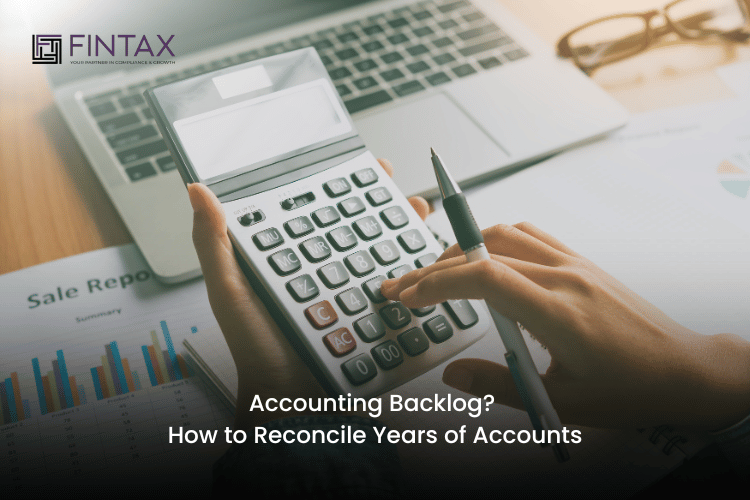Accounting Backlog? How to Reconcile Years of Accounts
German FinTax
October 15, 2025

Many UAE businesses discover too late that their books are months or even years behind. Whether it’s due to rapid growth, staff changes, or neglected reconciliations, that accounting backlog can snowball into compliance headaches, VAT penalties, and sleepless nights before audit season.
In this guide, German FinTax Consultancy explains how to reconcile years of accounts efficiently, avoid penalties, and regain full financial control. Plus, we’ll walk you through a real case study where a client overcame a multi-year backlog in just 60 days.
What Is an Accounting Backlog?
An accounting backlog refers to the delay or non-completion of bookkeeping and financial reconciliation over extended periods. It includes:
- Unposted invoices, receipts, and expenses
- Pending bank reconciliations
- Unadjusted payroll and tax entries
- Unmatched vendor or customer accounts
This situation typically arises due to:
- Inadequate accounting resources
- Rapid business growth without process upgrades
- Software migration or data loss
- Neglect in monthly or quarterly reconciliations
Why Accounting Backlogs Are Risky
Ignoring backlogs can severely disrupt your business operations.
Regulatory Penalties: Late or incorrect financial reporting can result in fines and legal issues.
Cash Flow Mismanagement: Without up-to-date records, you can’t track income and expenses accurately.
Inaccurate Business Insights: Delayed accounts hinder budgeting and financial forecasting.
Audit Challenges: Auditors require reconciled books to verify financial accuracy.
Addressing backlogs early ensures financial clarity and compliance with UAE tax regulations.
How to Reconcile Years of Accounts: Step-by-Step Guide
1. Gather All Financial Records
Start by collecting all relevant documents — invoices, bank statements, payroll records, VAT filings, and receipts. If documents are missing, retrieve them from your bank or digital accounting systems.
2. Categorise by Year or Quarter
Break down the backlog by fiscal year or quarter to make the reconciliation process manageable and logical.
3. Recheck the Chart of Accounts (COA)
Ensure your Chart of Accounts reflects accurate business categories and reporting standards. Remove duplicates or outdated codes.
4. Enter and Classify Missing Transactions
Input all unrecorded transactions into your accounting software. Start with major transactions and recurring expenses, then fill in smaller items.
Recommended platforms: QuickBooks, Tally Prime, Zoho Books, or Xero.
5. Perform Bank and Ledger Reconciliation
Reconcile every bank statement with your books. Identify and correct discrepancies such as unposted deposits, service charges, or duplicate entries.
6. Adjust Opening and Closing Balances
Ensure opening balances from previous years align with closing balances of the reconciled year. Any mismatch must be corrected before moving forward.
7. Conduct an Internal Review or Audit
Have an internal or external auditor (like German Fintax Consultancy) review the reconciled accounts for accuracy, corporate tax compliance, and VAT reporting readiness.
Case Study: Clearing a 3-Year Accounting Backlog in Just 60 Days
Background
A trading company in Dubai approached German Fintax Consultancy with a 3-year accounting backlog. Due to frequent staff changes and missing documentation, they were unable to finalise financial statements and submit Corporate Tax return.
Challenges Identified
- 8,000+ unrecorded transactions
- Missing supplier invoices and expense vouchers
- Four unreconciled bank accounts
- Incomplete VAT records across multiple branches
Our Approach
- Data Retrieval & Sorting: Collected physical and digital documents, categorised year-wise.
- Software Migration: Shifted accounting data to QuickBooks for efficiency and transparency.
- Reconciliation Process: Systematic review of all bank, supplier, and expense ledgers.
- VAT Reconciliation: Matched input and output VAT across the period to ensure compliance.
- Verification & Reporting: Conducted a detailed internal audit and finalised financial statements.
Results Achieved
Within just 60 days, our team processed over 8,000 transactions, reconciled four bank accounts, and prepared three years of financial statements — all fully audit-ready and VAT compliant.
- Reconciled all accounts and VAT reports
- Financial statements approved for audit
- Filed the corporate tax return on time
- Avoided potential non-compliance penalties worth AED 50,000+
Benefits of Accounting Backlog Clearance
- Accurate financial data for better business decisions
- Simplified audit and tax filing
- Improved stakeholder confidence
- Reduced compliance risks
- Better control over cash flow and profitability
How German Fintax Consultancy Can Help
Clearing years of backlog isn’t just about fixing old data — it’s about restoring confidence in your numbers. With clean books, you can finally make decisions based on facts, not guesswork.
At German Fintax Consultancy, we specialise in backlog accounting, bookkeeping cleanup, VAT and Corporate Tax compliance for businesses across the UAE. Our expert team of accountants and tax consultants ensure that your financial records are accurate, up to date, and compliant with FTA regulations.
Our services include:
– Multi-year accounting backlog clearance
– Bank and ledger reconciliation
– VAT audit and filing support
– Financial statement preparation
– Accounting system migration and setup
Whether you’re a small business or a large enterprise, we can help you turn years of financial chaos into precise, compliant, and reliable records.
Recent Post
Categories
Any Question?
About German FinTax
German FinTax Consultancy offers expert solutions in taxation, accounting, and compliance to individuals and businesses across the UAE.
- Dubai, United Arab Emirates
- info@germanfintaxconsultancy.com
- +971 50 667 0856
Quick Links
Copyright © 2025 German FinTax Consultancy. All rights reserved
